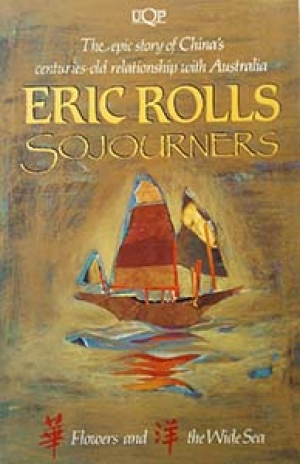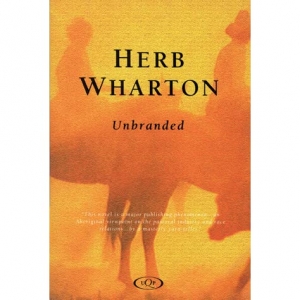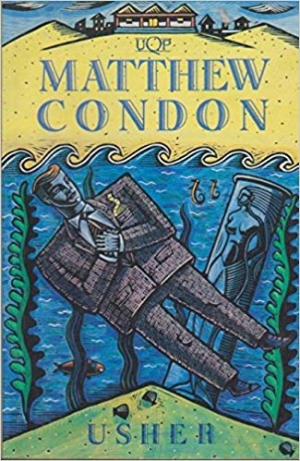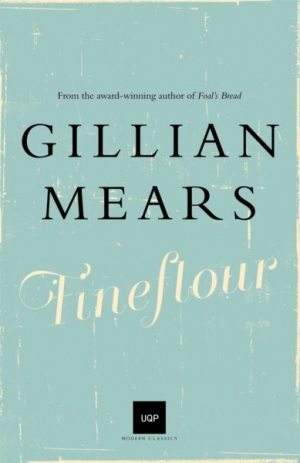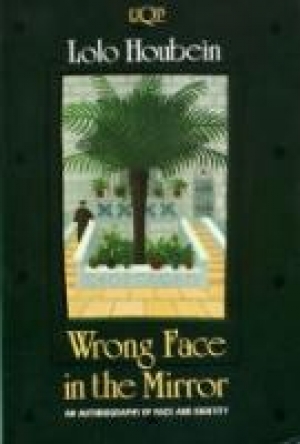University of Queensland Press
Connoisseurs of lapidary prose and the fine art of understated narrative are unlikely to enjoy this risky passionate novel. Nor will they enthuse over sentences such as, ‘The agony was so extreme I was numb with it, as if I had fallen into a vat of molten steel and could not immediately feel the enormity of the burn’, or, ‘Flooded with embarrassment, desire, delight, I thought stupidly, no wonder men go so wild over women, no wonder they dream continually of being lapped in that heavenly softness as they go about the hard world.’ However, Rosie Scott has made her own priorities clear in a 1991 essay called ‘Come and see the blood in the streets’.
... (read more)Daniel Kane reviews 'Sojourners: The epic story of China’s centuries-old relationship with Australia' by Eric Rolls
Mr Rolls has written an extraordinarily detailed history of the Chinese in Australia, interspersed with much additional related and unrelated matter. It is indeed a labour of love, written over a period of some twenty years, and the author has uncovered a large amount of fascinating and amazing information not readily available elsewhere. Much of this new material relates to the vibrant popular culture the Chinese brought with them: their food, cricket fighting, cock fighting, and other sorts of fairly harmless gambling; their diseases, living conditions and relations with their non-Chinese neighbours. A certain amount of the book concerns immigration acts and other forms of discrimination, of course, but the stronger impression one gets is a more positive one: the Chinese as hard workers and major contributors to Australian life.
... (read more)Herb Wharton’s first novel is a highly readable account of the lives of three stockmen in far west Queensland. Sandy is a white man, Bindi a Murri, and Mulga related to both of them through his parents.
... (read more)Alison Hoddinott reviews 'Boundary Conditions: The poetry of Gwen Harwood' by Jennifer Strauss
In Boundary Conditions, Jennifer Strauss, taking her title from the Eisenhart poem of that name, points to the centrality of Gwen Harwood’s concern with ‘those littoral regions where the boundary terms that define themselves on either side of us also overlap and interact'. It is here, she claims, that ‘our most intense experiences, for better or worse, occur, and it is here that she correctly and perceptively locates Gwen Harwood’s major preoccupations as well as her recurrent images and settings.
... (read more)Ian Buchanan reviews ‘Six Aces’ by Lex McAulay, ‘Laughing Gunner and Selected War Stories’ by Geoffrey C. Bingham, ‘Maverick Soldier’ by John Essex-Clark, ‘The Devils’ Garden’ by Peter Pinney, ‘Making the Legend’ by Denis Winter
These five books are about war and are all written by veteran infantrymen (except Making the Legend), a fact which is quite relevant. The fiction is every bit as gritty as the non-fiction. There’s none of the glamour that popular thrillers attach to war, and there’s none of the abject horror that literature generally attributes to war. Instead, there is what can only be described as honesty. These books are truly about the work of winning wars; not the glory or triumph, but the face-in-the-mud labour of it.
... (read more)The usher of the book’s title is T. Nelson Downs, long-time resident of Burleigh Heads. (The T. Doesn’t stand for anything; it was a parental whim.) He’s one of those wonderful, original, exasperating people full of impossible ideas (such as marketing gigantic ice sculptures for public occasions using skilled tradesmen brought out especially from Florence).
... (read more)Chris Wallace-Crabbe reviews 'The Annotated Such is Life' by Joseph Furphy and 'The Life and Opinions of Tom Collins: A study of the works of Joseph Furphy' by Julian Croft
At last, books about Such is Life and its endearingly attractive, quixotically sophisticated author, Joseph Furphy, are coming out. Three in the last few months is a welcome harvest, certainly a happier response than Furphy got during the prolonged Wilcannia showers of his life.
... (read more)There’s something about country towns that makes them peculiarly well suited to being described in short stories. Or is it that short stories are particularly suited to describe life in country towns? Eudora Welty and Flannery O’Connor wrote about little else, and several Australian writers’ best books have been collections of stories set in country towns: Olga Masters’ A Long Time Dying, for example, and Frank Moorhouse’s The Electrical Experience. Gillian Mears’s Fineflour is a work which may be placed with absolute confidence beside any of those mentioned above.
... (read more)Meg Sorensen reviews ‘Hero’ by Allan Baillie, ‘Lockie Leonard, Human Torpedo’ by Tim Winton, ‘The Road to Summering’ by Maureen Pople, and ‘Clare Street’ by Nora Dugon
Hero, Allan Baillie’s sixth novel for young readers, shows this seasoned storyteller at his best. Succinct yet incisive, it is a highly disciplined display of how tight technique can turn a single incident into an exciting story. Right from the first line, ‘A single drop of water exploded on Pamela Browning’s open exercise book’, we know we are on the precipice of an event towards which every mumble on the earth and rumble in the sky lead.
... (read more)On the 7 January 1934 in the Dutch town of Hilversum, a child was born and named Jopie Houbein. From her earliest days she felt that neither her face nor her name really fitted her. On the outside she was white, but all her feelings of kinship went out to people of alien races – a Chinese trader, travelling gypsies, school-friends from the East Indies, even a child disguised as St Nicholas’s black helper. One of her early fantasy playmates was the beautiful Indian actor Sabu, the Elephant Boy.
... (read more)

